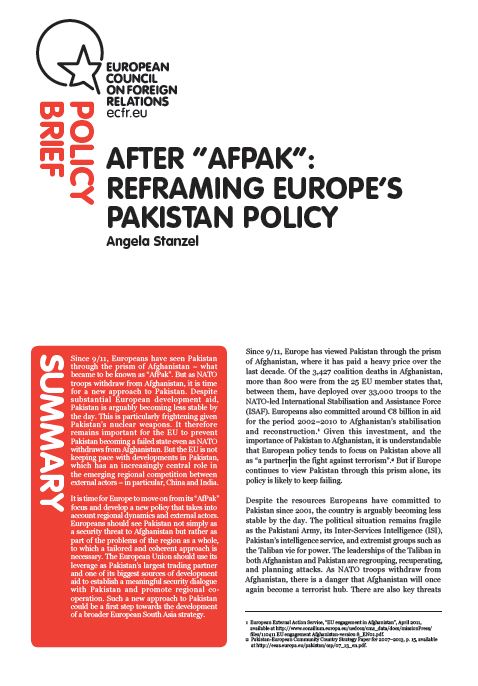After “AfPak”: Reframing Europe’s Pakistan policy
Time for a new approach that takes into account other regional dynamics
It is time for Europe to move on from its “AfPak” focus and develop a new policy towards Pakistan.
As anti-government clashes continue in Islamabad, Prime Minister Nawaz Sharif, who was elected last year, is struggling to hold on to power. Former cricketer Imran Khan and the cleric Tahir-ul-Qadri accuse the government of corruption and electoral fraud and are demanding his resignation.
At the weekend, 30,000 protesters clashed with security forces and tried to storm the prime minister’s house after talks between the opposition parties and the government had failed to bring an agreement. The clashes, in which three people were killed, raised the spectre of a military coup as NATO troops withdraw from Afghanistan.
In a new policy brief, After AfPak, ECFR policy fellow Angela Stanzel argues that it is time for the EU to develop a new approach to Pakistan. Since 9/11, Europeans have seen Pakistan through the prism of Afghanistan – what came to be known as “AfPak”.
As NATO troops withdraw from Afghanistan, it remains important for the EU to prevent Pakistan becoming a failed state. But the EU is not keeping pace with developments in Pakistan, which has an increasingly central role in the emerging regional competition between external actors – in particular, China and India.
Stanzel argues that Europe needs a new policy that takes into account regional dynamics and external actors as a first step towards a broader European South Asia strategy.
The EU should:
- see Pakistan not simply as a security threat to Afghanistan but rather as part of the problems of the region as a whole;
- use its leverage as Pakistan’s largest trading partner and one of its biggest sources of development aid to establish a meaningful security dialogue with Pakistan and promote regional co-operation.
“If Europe continues to view Pakistan through the prism of ‘AfPak’, it is likely to keep failing.” – Angela Stanzel
The European Council on Foreign Relations does not take collective positions. ECFR publications only represent the views of their individual authors.



